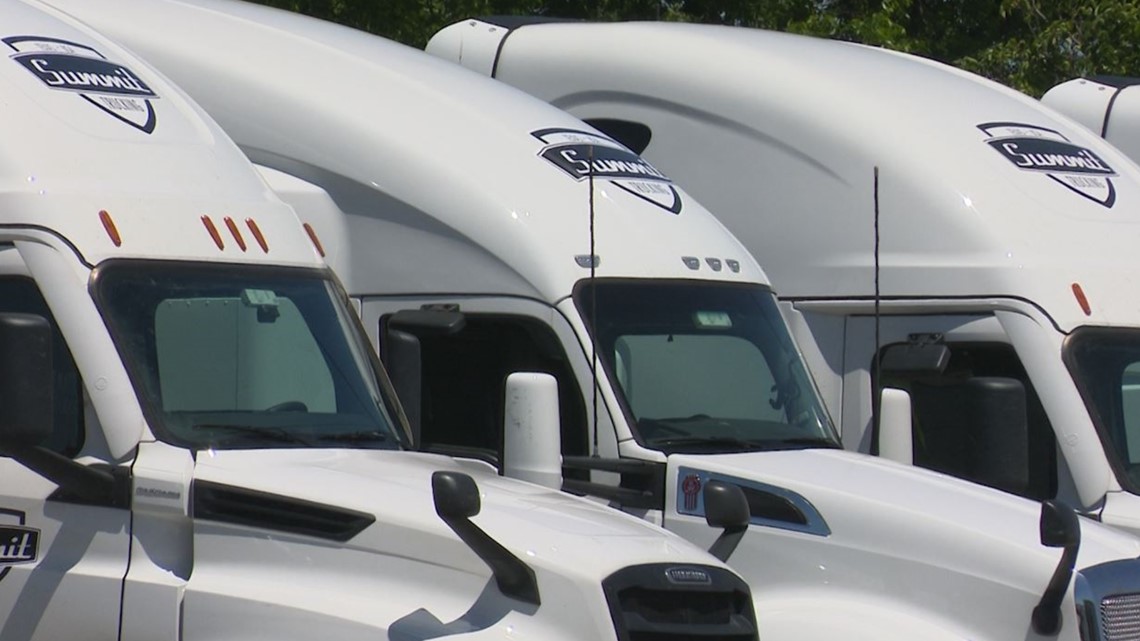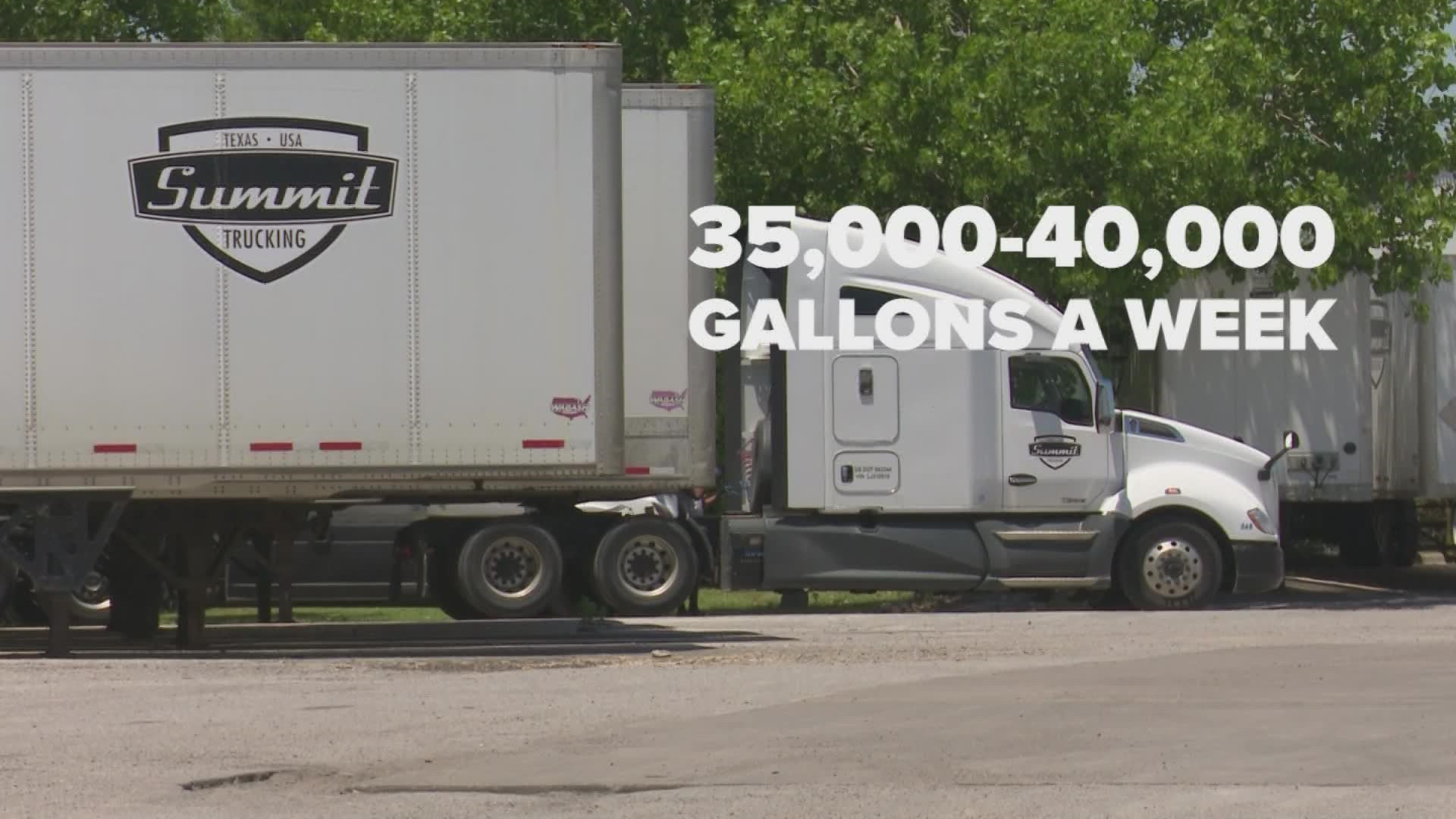DALLAS — Editor's Note: In a previous version of this article, there was some incorrect wording related to Summit Trucking's fuel surcharge. This has been updated to accurately reflect how the fee works.
As gas prices rise across Texas and the country, one of the hardest-hit industries continues to be the trucking industry. Some companies are now having to make adjustments to how they run their businesses day-to-day.
The statewide gas price average in Texas is $4.24 for a gallon of regular unleaded fuel, according to the American Automobile Association (AAA).
And when it comes to diesel prices, these are even higher as the current average price in Texas is $5.07. This is a cost that directly hits truck drivers across the country.
Life of a trucker
Andy Felker knows what it's like to deal with high gas prices on a daily basis. He lives in North Texas but is an over-the-road truck driver, meaning he carries and picks up items from all around the country.
"I've actually driven in all lower 48 states," Felker said. "I've driven in Canada. I've driven in Alaska. Everywhere but Hawaii. This is a job that needs to be done. It needs smart people. It needs reliable people. I want to be a part of that."
With all of that driving, making stops at the gas pump is a part of his daily routine.
"It's long days, but if you plan your trips right and you hold yourself accountable, your days can look a lot more like how you want them to look than rather than some sort of scheduled sort of thing," Felker said.


Billy Mason, who grew up loving trucks, is known as a local driver. This means he doesn't drive outside of the North Texas area. He can make most of his trips within a day.
"I wanted to get out over the road," Mason said, speaking to why he wanted to get into trucking. "Do things. Get out of the office."
Even though he drives fewer miles day-to-day compared to Felker, he's also feeling the pain at the pump.
"Gas prices are outrageous," Mason said. "It's really hurting."
Gas prices impact on a trucking company
Felker and Mason are both employees for Summit Trucking, a Dallas-based trucking company founded in 1997. Summit Trucking has about 200 trucks and 500 trailers with about 150 trucks on the road a day.
Bart Plaskoff is the CEO of Summit Trucking, saying his company moves a variety of items, such as furniture, dog food and cleaning supplies.
"Being a truck driver is the backbone of the economy," Plaskoff said. "A lot of people don't realize that everything you touch every day was delivered by a truck. It's a thankless job, and they keep us rolling. They keep America going."
Plaskoff said he has a fuel surcharge that the customer pays for to help absorb some of the cost of gas. With rising diesel prices, that means this fee is also going up since it is correlated with these costs.
"It's definitely cut into our profit," Plaskoff said. "The cost of everything we purchase has gone up over the past two years. Tires, trailers, trucks, insurance, fuel. Across the board, everything is up. And unfortunately, we're having to pass that onto the consumer."


Summit Trucking has pre-existing deals with some Texas gas stations and truck stops to give them a discount at the pump. Plaskoff said he is working to try and help get other North Texas truckers onto his deal as well.
"We are out there extending a hand to the smaller guys," Plaskoff said. "We're able to get a discount at the larger truck stop chains as far as a price per gallon on diesel. And the smaller guys aren't able to do that."
Plaskoff said his drivers purchase between 35,000-40,000 gallons of diesel a week. Excluding discounts at truck stop chains, the rise of diesel prices from this day last year to now comes out to about $85,000 a week more going into fuel costs.
"We're definitely out there spending more money on diesel," Plaskoff said.
Truckers hurting across Texas
The Texas Trucking Association said of the 753,150 truck drivers in the state, many are accepting jobs based on a set price for gas only for the increase to cut into their expected pay for the trip.
"One of the highest costs that anybody in trucking is looking at is labor, one or fuel, John Esparza said, the president of the Texas Trucking Association. "Depending on where we are in the economy, one can easily surpass the other."
Esparza said independent truck drivers and smaller, independent contractors are facing similar situations within the context of the "spot market," which is when a trucker or company gets a one-time fee to move a load or shipment.
The slowed supply chain has forced many to be stuck with paying for their fuel without any work on the road.
"Things are going to get more and more expensive over the summer," Esparaza said.
Diesel's impact on the U.S. economy
Diesel fuel is one of the most important factors when it comes to the world economy, according to the U.S. Energy Information Administration.
Most items transported by trucks and trains run off diesel engines. Most construction, farming and military vehicles also use diesel fuel.
In 2020, distillate fuel consumption by the U.S. transportation sector, which is pretty much diesel fuel, was about 45 billion gallons, an average of about 122 million gallons per day, the U.S. Energy Information Administration said.
Diesel fuel is also used in diesel engine generators to generate electricity. Many industrial facilities, large buildings, institutional facilities, hospitals, and electric utilities have diesel generators for backup and emergency power supply, according to the U.S. Energy Information Administration.
Preparing for the worst
Since he's been in the business for more than two decades, Plaskoff said he's always tried to stay prepared for a "rainy day" and have flexibility on what he needs to spend money on.
"Trucking is a very cyclical business," Plaskoff said. "Wall Street usually looks to trucking to see where the economy is going to go."
Before the recent rise in inflation and gas prices, Plaskoff already has invested in some auxiliary-power units, or APUs, for all of his trucks.


Since truckers have to regularly stop at truck stops to get some sleep in their vehicles, these units allow for the engine to be turned off but the driver to still have the air conditioning or heater running. This uses less gas while also releasing fewer emissions into the atmosphere.
"So when the truck parks at a shipper or receiver overnight, the engine will shut off and the APU will kick on," Plaskoff said.
To see what the daily gas prices are in Texas and the United States, you can check out AAA statistical breakdown here.

